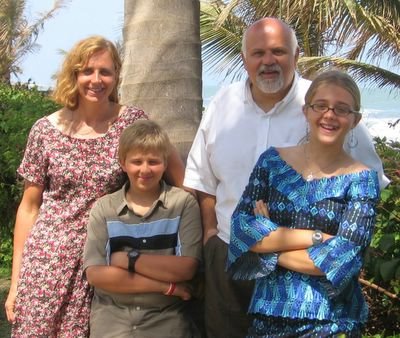 The trip to Koon Town. A jarring two hour trek.
The trip to Koon Town. A jarring two hour trek.What I mean is WHDP is realizing that in order to more fully do its job to strengthen women, it cannot focus only on women and ignore the men of the community. Even if it remains primarily a “Women Health and Development Program,” it needs to figure out how to include men. Men are simply too important to the health of the community and the women, especially in this patriarchal society. In a way, this was inevitable. Take Koon Town for instance. WHDP has been in this little village for a decade, working exclusively with women, building skills, enhancing capacity, empowering them, transforming them-- while the men of the village watched from the sidelines. Yet the men are key stakeholders and of course have enormous interest in how

Koon Town, viewed from the road in. The arrow indicates my location in the next pic, looking back toward this point.


So last week, WHDP sent my Liberian co-facilitator, John Dominic Moore, and Yers Trooly up to Koon Town to begin the process of engaging them with a view toward their empowerment and building their capacity as well. John and I had a great time. Here we were, gathered with 21 Koon Town men, in the Women Empowerment Center—“built by women for women,” and discussing ways to make Koon Town a better place.

The men posing in front of our meeting place-- the Women Empowerment Center.
It felt like we were breaking some invisible barrier, like the time had come to work in a new way—women and men together—on community development.
 The men were proud of this-- a cleared field, being prepared for cassava. Its a big field, and it is cleared without anything but the most basic hand tools-- in the hottest months of the year for harvest in the wet season. I almost died just walking the mile uphill (in the 100F heat of the day) it takes to get there. My bald head makes a great brain oven.
The men were proud of this-- a cleared field, being prepared for cassava. Its a big field, and it is cleared without anything but the most basic hand tools-- in the hottest months of the year for harvest in the wet season. I almost died just walking the mile uphill (in the 100F heat of the day) it takes to get there. My bald head makes a great brain oven.There are challenges ahead. One of the reasons WHDP came to be was to support women, most of whom were victims of violence because they are women. Gender Based Violence is still a problem in Koon Town. Wife abuse is still an all too prevalent part of the culture in this male dominated corner of the world. The fact that WHDP has empowered so many women has also, in some cases, created more conflict. The men feel their masculinity is threatened, their way of relating under attack. How can we help men see themselves in a new way, help them redefine their masculinity in a way that preserves their sense of “being a man,” and at the same time uplifts empowers the women in their lives? How to we teach these men what it means to be a man without sending the message that they’ve not been good at being men up to now?

The trip home. Following a truck laden with raw latex from the rubber trees.
The good news is, the guys seem eager to participate in the process. They seemed open and willing to engage us. They’ve seen what WHDP has done for "their women," and even though it has sometimes created conflict and left the men feeling powerless and out of the loop, they see it has produced impressive results. The women have learned skills, are more capable, have provided for the family. “Yes,” we imagine the men thinking, “they seem to be more assertive, and talk back when in the past they would have kept quiet, but maybe that is a good thing. Maybe if we figure out a better way to be together, we can figure out a better way to work together. And maybe together, we can make Koon Town a better place to live.” What we imagine, we can work to make happen.
 I tried to get a shot with the shadows to give an idea of how bumpy these roads are. It didn't work. The roads may look flat. They are not.
I tried to get a shot with the shadows to give an idea of how bumpy these roads are. It didn't work. The roads may look flat. They are not.

1 comment:
Very cool! I love how God works in mysterious ways!
Brandi
Post a Comment